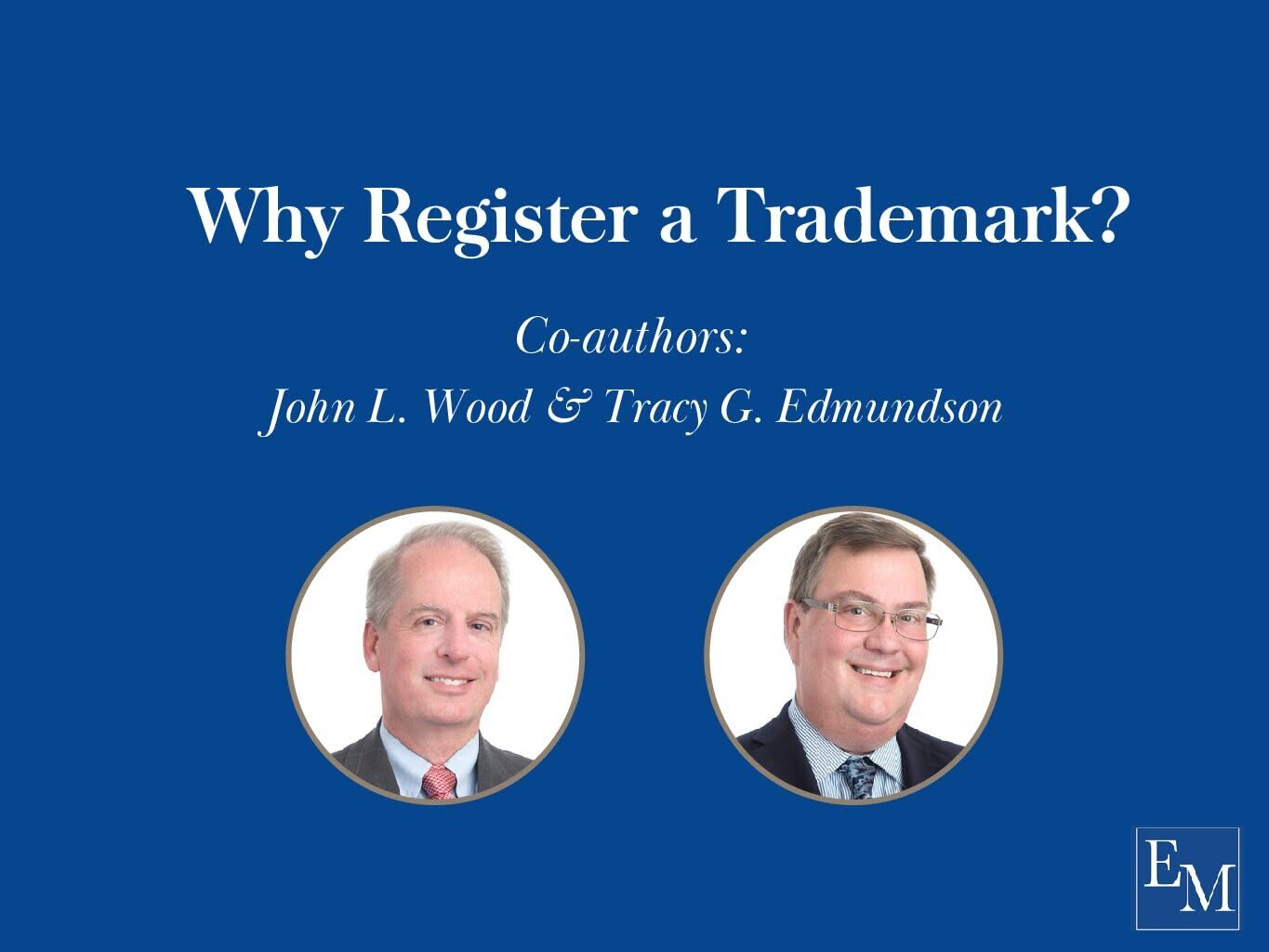[et_pb_section fb_built=”1″ _builder_version=”4.16″ collapsed=”off” global_colors_info=”{}”][et_pb_row _builder_version=”4.16″ background_size=”initial” background_position=”top_left” background_repeat=”repeat” global_colors_info=”{}”][et_pb_column type=”4_4″ _builder_version=”4.16″ custom_padding=”|||” global_colors_info=”{}” custom_padding__hover=”|||”][et_pb_text _builder_version=”4.16″ background_size=”initial” background_position=”top_left” background_repeat=”repeat” global_colors_info=”{}” custom_padding=”0px|||||”]
Why Register a Trademark?
Registration of a trademark, although not mandatory, is recommended because registration can substantially expand the common law rights of a trademark owner. A trademark may be registered federally at the USPTO if used in interstate commerce. Moreover, a trademark may be registered at the registration office in any of the 50 states where used.
In general, state registrations offer only limited additional benefit over no registration. A state registration in a particular state can accord standing to sue in that state’s courts of law, pursuant to corresponding state statutes. Further, a state registration can aid in proving priority of use. However, state trademark laws, and especially the level of protection accorded trademark owners by state trademark laws, vary widely from state to state.
Federal registration of a trademark at the USPTO is strongly recommended because federal registration provides nationwide rights. Federal registration expands common law trademark rights in at least the following ways:
Nationwide Rights
(a) Nationwide Rights – Under U.S. common law, rights extend only throughout the geographical areas where the mark has actually been used or become known. A junior party in a remote location can adopt a senior party’s mark for identical goods or services and successfully defend against an infringement claim on the basis of good faith, ignorant adoption. Under these circumstances, the junior party can even claim superior rights in its own territory and prevent the senior party from expanding use into the junior party’s territory. However, if the senior party’s mark is federally registered at the USPTO, then the good faith, ignorant adoption defense is unavailable to a junior user in an infringement suit because the junior party is on legal, constructive notice nationwide.
Federal Jurisdiction
(b) Federal Jurisdiction – The federal registration at the USPTO creates federal question jurisdiction for infringement suits. Hence, a federal registration accords standing to institute lawsuits against parties in federal court. This can be a tremendous advantage. Trademark suits in federal courts minimize any prejudice that might be experienced by a litigant who is foreign to a particular geographical region. Moreover, the outcome of federal trademark suits is more predictable than in-state trademark suits because of the extensive federal case precedent that has developed over many years.
Significant Value As Court Evidence
(c) Significant Value As Court Evidence – A federal trademark registration can be strategically useful in court. First, a certificate of federal registration is prima facie evidence in a court of law of the registrant’s ownership right and exclusive right to use the mark throughout the territories of the United States. Second, the registration certificate is prima facie evidence in a court of law of the registrant’s continuous use of the mark in commerce from at least as early as (1) the filing date of a “use” application or (2) the alleged use date in an “intent to use” application. Third, many court cases have held that a federal registration is presumptive evidence that the mark, even if arguably descriptive, is distinctive. The rationale for this presumption is that the mark has been determined to be registrable by the expert administrative agency, or the USPTO. This possible presumption may eliminate the need to prove secondary meaning in a court case. Finally, the right to use a registered mark may become “incontestable” in a court of law after five years of use, if proper documentation is filed at the USPTO. This incontestability eliminates important defenses from infringement actions, such as lack of distinctiveness and lack of secondary meaning.
Federal Statutory Remedies
(d) Federal Statutory Remedies – Federal statutes prescribe recovery of profits, damages, and costs, as well as equitable relief in the form of injunctions and seizure orders. Even treble damages and attorney’s fees can be obtained in exceptional cases.
Trademark Counterfeiting
(e) Trademark Counterfeiting – The Trademark Counterfeiting Act of 1984 creates very substantial civil and criminal penalties for the counterfeiting of federally registered trademarks.
Customs Recordation
(f) Customs Recordation – The federal registration can be filed in the U.S. Customs Service to prevent importation of goods bearing the infringing mark into the United States.
Deterrent Effect
(g) Deterrent Effect – A federal registration is very likely to be uncovered during a clearance search, which is usually performed by a junior party before adopting a new mark. Notice of the federal registration tends to deter junior parties from adopting confusingly similar marks which otherwise could be infringements.
Co-authors: John L. Wood & Tracy G. Edmundson
[/et_pb_text][/et_pb_column][/et_pb_row][/et_pb_section]

